RCM
New member
Without dialogue with the Government, the CGT opens the debate of its regions to advance with the January 24 strike - Infobae

Source:

 www.infobae.com
www.infobae.com
January 09, 2024
The Cegetista delegates from the interior will endorse this Wednesday the first strike against Javier Milei, while at the workers' center they confirm that they no longer have interlocutors with the Casa Rosada. First UPCN protest and expectation for teacher salaries.
By Ricardo Carpena
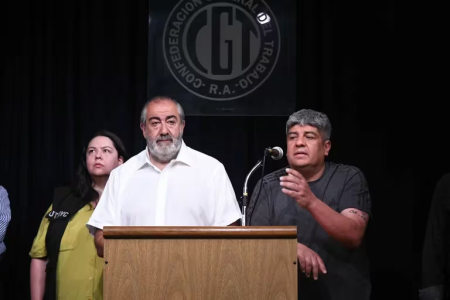
The co-heads of the CGT Héctor Daer and Pablo Moyano will lead the plenary session of the regional elections this Wednesday (Télam)
Without channels of dialogue with the Government, the CGT makes decisive progress in organizing the 12-hour strike with mobilization on January 24: This Wednesday a plenary session of regional delegations of the labor union will take place to give support to the protest from inside the country.
The meeting, which will take place at 11 in the Felipe Vallese room at the Azopardo 802 headquarters, will mark another advance in the realization of the first general strike of the CGT since May 2019, amid the clear signs of hardening of the administration of Javier Milei towards unionism: the The latest demonstration in this sense was reflected with the displacement of Horacio Pitrau from the Undersecretariat of Labor for having deployed a negotiating strategy towards union members.
As anticipated Infobae, the resignation of Pitrau, who supported the Secretary of Labor, Omar Yasín , was promoted last week by the hard wing of the Government, which is made up of the advisor Federico Sturzenegger and the chief of staff, Nicolás Posse, in the face of the enormous annoyance that the labor authorities caused them to achieve the approach of the head of the Union of Commerce, Armando Cavalieri, in the midst of tensions with the CGT over the labor reform contained in DNU 70.
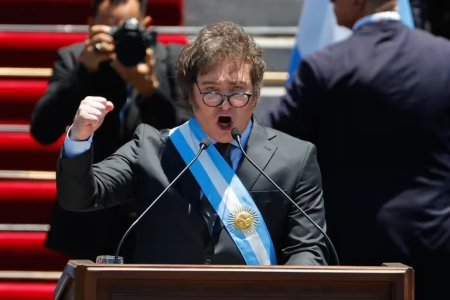
The government of Javier Milei shows signs of hardening before the CGT (EFE)
The Milei decree placed limits on solidarity quotas, an additional system of union collection through collective agreements, by establishing that They could be charged only if there was “explicit consent” from the workers. The key to this financing resource of the unions is precisely that once it is agreed with the employers in the agreements, a certain percentage is deducted from the salaries of all workers in an activity, whether they are affiliated or not.
After warning that this change in solidarity dues was going to lead ”bankruptcy” to his union, Cavalieri, who manages the union largest in the country, with 1,200,000 members, met with the Minister of Human Capital, Sandra Pettovello, to present her claim about the solidarity fees.
The photo of the meeting between Pettovello and Cavalieri just when the CGT was debating a plan to fight against the labor reform caused a deep impact on the union ranks and it seemed a successful maneuver by the Ministry of Labor, which promised the head of Commerce that, at his request, a interpretation ruling could be issued so that would continue to collect without changes the solidarity fees.
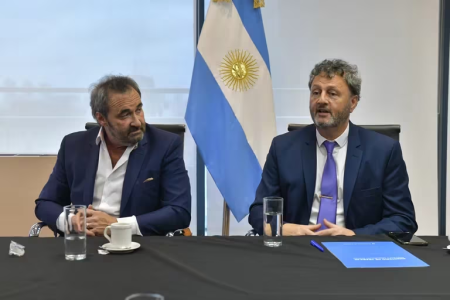
Horacio Pitrau, the displaced Labor official, and Omar Yasín
Yasín and Pitrau imagined this move as a way to drive a wedge into the union world because each leader would be forced to manage an audience to request the same opinion that Cavalieri had obtained, since that official decision would not have general scope.a CGT that was beginning to paint its face against the Government, getting support from it like , in this case, that of the largest union in Argentina.weaken Deep down, it was a way of trying to
But, in addition, Cavalieri announced to Pettovello his decision to adhere from his agreement to the new compensation system provided for in the DNU with the creation of a Work Termination Fund like the one that governs the UOCRA. That decision was going to be imitated by other important unions.
However, the agreement between Pettovello and Cavalieri unleashed a storm in the Government. First it was Federico Sturzenegger, the brain of the plan to deregulate the economy, who expressed his rejection to the minister. /span> in both cases linked to the Techint Group. Julio Cordero,andMiguel Angel Ponte accompanied by two labor lawyers with a tough profile who developed the labor reform libertarian, Nicolás Posse, to the decision that benefited Cavalieri for the collection of solidarity fees. From a first talk between the two arose a meeting chaired by the Chief of Staff,
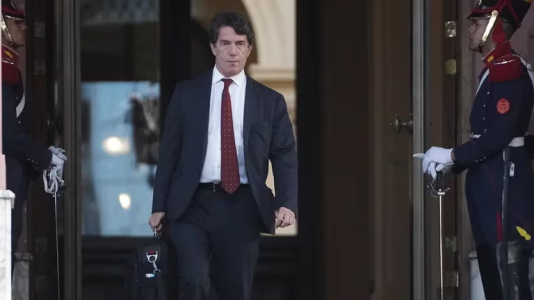
Nicolás Posse, Chief of Staff, one of the exponents of the hardline Government that cut off dialogue with the CGT (Franco Fafasuli)
There it was decided to call Yasín to “ask for the head” of someone responsible for the “error ” that made the payment of solidarity dues more flexible because they understood that they had to be tougher in the face of unionism after the CGT moved forward with its judicial offensive against the DNU (which finally managed to stop the labor reform) and ordered the strike with mobilization to Congress on January 24.
That is why it was finally decided to remove Pitrau from the Undersecretariat of Labor, who, in practice, was the labor official with a>for Yasín's reserved meetings with important union members.key in recent weeks, your participation was fluid union contacts :(he was Secretary of Labor under Jorge Triaca during the Mauricio Macri government) andgreater experience
Now, in the CGT they admitted Infobae who no longer have interlocutors < a i=4>with the Casa Rosada: “What happened in the Ministry of Labor responds to the debate between hawks and dialogueists of the Government, where the officials are all fuses and the one in charge does not give them hierarchy - highlighted a union member -. It is demonstrated that they are officials without the capacity to guarantee the negotiations. Until now, only agreements with business corporations and their interests are respected.”
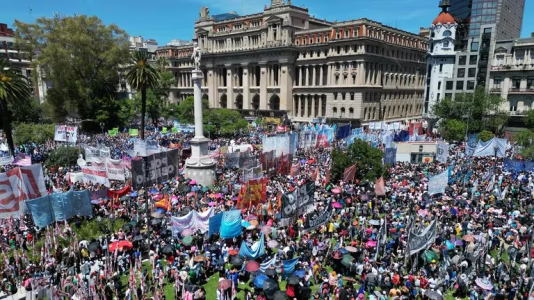
The CGT held an event on December 27 in Plaza Lavalle to protest against the DNU of Javier Milei (AFP)
The strike with mobilization to Congress is complemented by the legal strategy of the CGT, which through a precautionary measure achieved stop in labor justice the labor reform contained in DNU 70.
An indication that even the most moderate unionism joined the protests against the Government is the act that the Union of Civil Personnel of the Nation (UPCN) will take place this Tuesday, at 2:30 p.m., at the door of the National Arts Fund, in Alsina 673, “in defense of the culture and against the Omnibus Law that seeks to eliminate cultural institutions.”
It will be the first protest against the Government that this union will make, led by Andrés Rodríguez, who represents the majority of the workers of the national public administration and has until now prioritized negotiations with the authorities to try to avoid layoffs in the State.
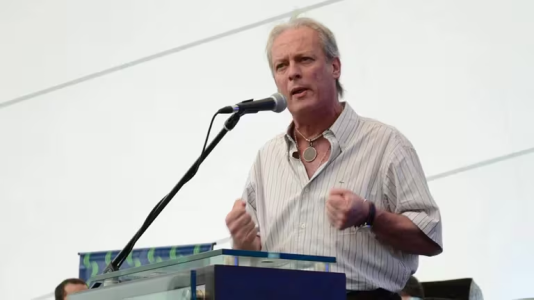
Andrés Rodríguez, deputy secretary of the CGT and head of UPCN, makes his first protest against the Government
In a statement, UPCN highlighted that “the National Arts Fund, created in 1958, was conceived as a culture bank and is financed with own funds1.8%”. of the national budget, but the cultural sector generates an added value of 0.2%, without any contribution from the National Treasury” and, in addition, he emphasized that “investment in culture represents only
In this scenario of conflict, furthermore, the unions that bring together the teachers are betting on a negotiation that guarantees the improvement of their salaries. From the CGT, its secretary of Educational Policies and leader of the Argentine Teachers Union (UDA), Sergio Romero, confirmed that the secretary of Education, Carlos Torrendell, will convene the national teachers' joint meeting next February “motivated by our concern to urgently increase the salary items” of the sector.
He considered “very positive” the call for teacher parity because “it clears up those atrocious noises that indicated that this fundamental tool was going to be closed for social peace” and warned that it is worrying “the delay in the National Teacher Incentive Fund, an integral part of our remuneration, and the necessary updating in matter of amounts destined for teaching material.”
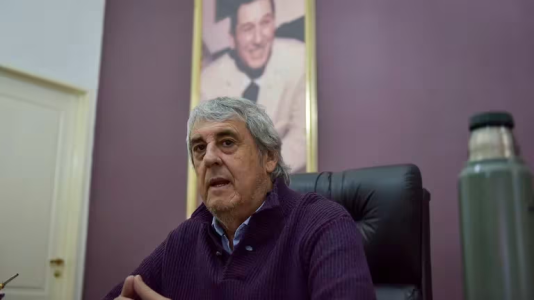
Sergio Romero, Secretary of Educational Policies of the CGT and leader of UDA, proposes to "urgently increase" teacher salary
“We have many important issues to address in the joint meeting with the State,” added Romero, “since the public management teacher lives with permanent precariousness of working conditions and the provinces and Nation must invest more in education and discuss these issues with official teachers before blaming issues of absenteeism, for example.”
The head of UDA also announced that he intends to “discuss the declaration of essential public service of education” because, as he warned , “as a counterpart, we are represented with the idea of a policy of definancing, lack of investment and low salaries.”

Source:

Sin diálogo con el Gobierno, la CGT abre el debate de sus regionales para avanzar con el paro del 24 de enero
Los delegados cegetistas del interior avalarán este miércoles la primera huelga contra Javier Milei, mientras en la central obrera confirman que ya no tienen interlocutores con la Casa Rosada. Primera protesta de UPCN y expectativa por el salario docente
January 09, 2024
The Cegetista delegates from the interior will endorse this Wednesday the first strike against Javier Milei, while at the workers' center they confirm that they no longer have interlocutors with the Casa Rosada. First UPCN protest and expectation for teacher salaries.
By Ricardo Carpena

The co-heads of the CGT Héctor Daer and Pablo Moyano will lead the plenary session of the regional elections this Wednesday (Télam)
Without channels of dialogue with the Government, the CGT makes decisive progress in organizing the 12-hour strike with mobilization on January 24: This Wednesday a plenary session of regional delegations of the labor union will take place to give support to the protest from inside the country.
The meeting, which will take place at 11 in the Felipe Vallese room at the Azopardo 802 headquarters, will mark another advance in the realization of the first general strike of the CGT since May 2019, amid the clear signs of hardening of the administration of Javier Milei towards unionism: the The latest demonstration in this sense was reflected with the displacement of Horacio Pitrau from the Undersecretariat of Labor for having deployed a negotiating strategy towards union members.
As anticipated Infobae, the resignation of Pitrau, who supported the Secretary of Labor, Omar Yasín , was promoted last week by the hard wing of the Government, which is made up of the advisor Federico Sturzenegger and the chief of staff, Nicolás Posse, in the face of the enormous annoyance that the labor authorities caused them to achieve the approach of the head of the Union of Commerce, Armando Cavalieri, in the midst of tensions with the CGT over the labor reform contained in DNU 70.

The government of Javier Milei shows signs of hardening before the CGT (EFE)
The Milei decree placed limits on solidarity quotas, an additional system of union collection through collective agreements, by establishing that They could be charged only if there was “explicit consent” from the workers. The key to this financing resource of the unions is precisely that once it is agreed with the employers in the agreements, a certain percentage is deducted from the salaries of all workers in an activity, whether they are affiliated or not.
After warning that this change in solidarity dues was going to lead ”bankruptcy” to his union, Cavalieri, who manages the union largest in the country, with 1,200,000 members, met with the Minister of Human Capital, Sandra Pettovello, to present her claim about the solidarity fees.
The photo of the meeting between Pettovello and Cavalieri just when the CGT was debating a plan to fight against the labor reform caused a deep impact on the union ranks and it seemed a successful maneuver by the Ministry of Labor, which promised the head of Commerce that, at his request, a interpretation ruling could be issued so that would continue to collect without changes the solidarity fees.

Horacio Pitrau, the displaced Labor official, and Omar Yasín
Yasín and Pitrau imagined this move as a way to drive a wedge into the union world because each leader would be forced to manage an audience to request the same opinion that Cavalieri had obtained, since that official decision would not have general scope.a CGT that was beginning to paint its face against the Government, getting support from it like , in this case, that of the largest union in Argentina.weaken Deep down, it was a way of trying to
But, in addition, Cavalieri announced to Pettovello his decision to adhere from his agreement to the new compensation system provided for in the DNU with the creation of a Work Termination Fund like the one that governs the UOCRA. That decision was going to be imitated by other important unions.
However, the agreement between Pettovello and Cavalieri unleashed a storm in the Government. First it was Federico Sturzenegger, the brain of the plan to deregulate the economy, who expressed his rejection to the minister. /span> in both cases linked to the Techint Group. Julio Cordero,andMiguel Angel Ponte accompanied by two labor lawyers with a tough profile who developed the labor reform libertarian, Nicolás Posse, to the decision that benefited Cavalieri for the collection of solidarity fees. From a first talk between the two arose a meeting chaired by the Chief of Staff,

Nicolás Posse, Chief of Staff, one of the exponents of the hardline Government that cut off dialogue with the CGT (Franco Fafasuli)
There it was decided to call Yasín to “ask for the head” of someone responsible for the “error ” that made the payment of solidarity dues more flexible because they understood that they had to be tougher in the face of unionism after the CGT moved forward with its judicial offensive against the DNU (which finally managed to stop the labor reform) and ordered the strike with mobilization to Congress on January 24.
That is why it was finally decided to remove Pitrau from the Undersecretariat of Labor, who, in practice, was the labor official with a>for Yasín's reserved meetings with important union members.key in recent weeks, your participation was fluid union contacts :(he was Secretary of Labor under Jorge Triaca during the Mauricio Macri government) andgreater experience
Now, in the CGT they admitted Infobae who no longer have interlocutors < a i=4>with the Casa Rosada: “What happened in the Ministry of Labor responds to the debate between hawks and dialogueists of the Government, where the officials are all fuses and the one in charge does not give them hierarchy - highlighted a union member -. It is demonstrated that they are officials without the capacity to guarantee the negotiations. Until now, only agreements with business corporations and their interests are respected.”

The CGT held an event on December 27 in Plaza Lavalle to protest against the DNU of Javier Milei (AFP)
The strike with mobilization to Congress is complemented by the legal strategy of the CGT, which through a precautionary measure achieved stop in labor justice the labor reform contained in DNU 70.
An indication that even the most moderate unionism joined the protests against the Government is the act that the Union of Civil Personnel of the Nation (UPCN) will take place this Tuesday, at 2:30 p.m., at the door of the National Arts Fund, in Alsina 673, “in defense of the culture and against the Omnibus Law that seeks to eliminate cultural institutions.”
It will be the first protest against the Government that this union will make, led by Andrés Rodríguez, who represents the majority of the workers of the national public administration and has until now prioritized negotiations with the authorities to try to avoid layoffs in the State.

Andrés Rodríguez, deputy secretary of the CGT and head of UPCN, makes his first protest against the Government
In a statement, UPCN highlighted that “the National Arts Fund, created in 1958, was conceived as a culture bank and is financed with own funds1.8%”. of the national budget, but the cultural sector generates an added value of 0.2%, without any contribution from the National Treasury” and, in addition, he emphasized that “investment in culture represents only
In this scenario of conflict, furthermore, the unions that bring together the teachers are betting on a negotiation that guarantees the improvement of their salaries. From the CGT, its secretary of Educational Policies and leader of the Argentine Teachers Union (UDA), Sergio Romero, confirmed that the secretary of Education, Carlos Torrendell, will convene the national teachers' joint meeting next February “motivated by our concern to urgently increase the salary items” of the sector.
He considered “very positive” the call for teacher parity because “it clears up those atrocious noises that indicated that this fundamental tool was going to be closed for social peace” and warned that it is worrying “the delay in the National Teacher Incentive Fund, an integral part of our remuneration, and the necessary updating in matter of amounts destined for teaching material.”

Sergio Romero, Secretary of Educational Policies of the CGT and leader of UDA, proposes to "urgently increase" teacher salary
“We have many important issues to address in the joint meeting with the State,” added Romero, “since the public management teacher lives with permanent precariousness of working conditions and the provinces and Nation must invest more in education and discuss these issues with official teachers before blaming issues of absenteeism, for example.”
The head of UDA also announced that he intends to “discuss the declaration of essential public service of education” because, as he warned , “as a counterpart, we are represented with the idea of a policy of definancing, lack of investment and low salaries.”


